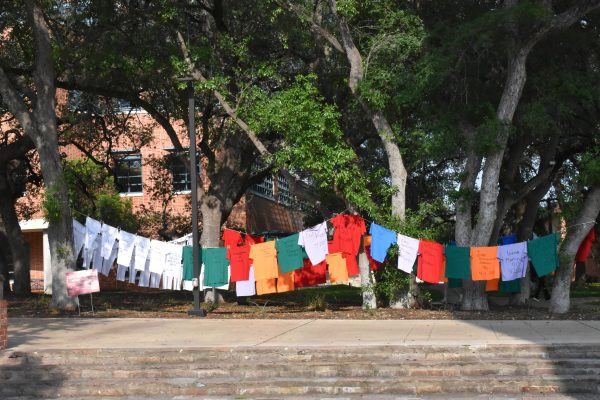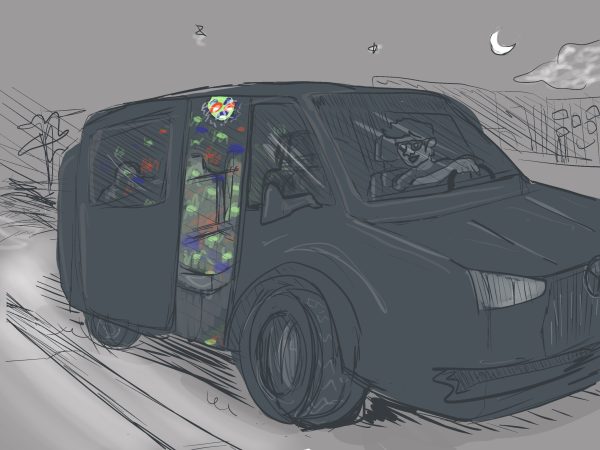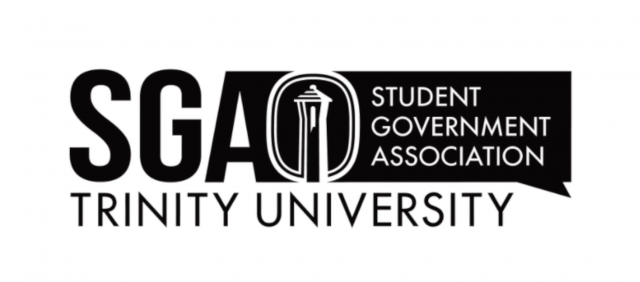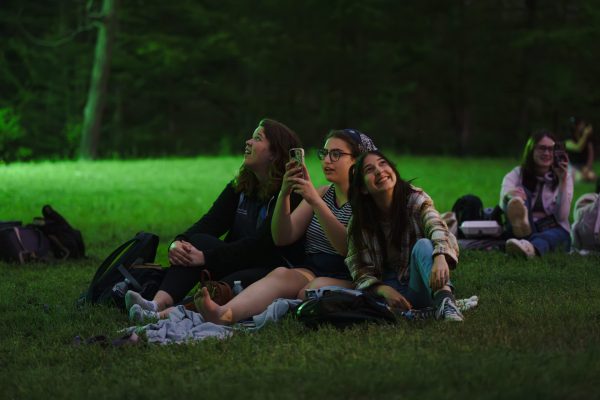Previously, on SGA: Exclusive with San Antonio mayor
The following covers the meeting on Feb. 13
This SGA meeting was attended by Vanessa Beasley, Trinity University president, Trey Beasley, the first-gentleman of the university, and Ron Nirenberg, the mayor of San Antonio.
At the start of the meeting, SGA and their special guests took a photo outside of Dicke Hall. As President Danny Nguyen attempted to get everyone situated for the photo, Nirenberg joked with Beasley that the situation was a “test of leadership skills.” The group photo was taken courtesy of the Trinitonian.
After taking additional pictures with President Nguyen, Vice President Donya Ahmadi, Chief of Staff Emily King, Advisor Demi Brown and Nirenberg, the Beasleys departed.
Q&A with Nirenberg:
President Nguyen asked Nirenberg to describe his Trinity experience and how it impacted the person he is today.
Nirenberg explained that he fell in love with the campus at a Trinity InFocus experience and chose to attend the university because he wanted a classical liberal arts education. He discussed his experience as a communication student and working “in print journalism” at the Trinitonian, TigerTV and as the station manager for KRTU. Nirenberg went on to state that over the course of his four years as a student at Trinity, he also fell in love with the city of San Antonio and that if it hadn’t been for Trinity, he wouldn’t be in San Antonio at all.
President Nguyen asked Nirenberg to describe the importance of student government.
Nirenberg stated that he is a big believer in young leaders getting more involved in government, specifically at a local level because the impact of college students can do good in the community. He claimed that there are over 100,000 college students in San Antonio — more so than in Austin — which grants students the opportunity to have a large influence over the local office through voting. He also explained how he has worked to increase the influence of young people in local government both as a city council member and as mayor, taking steps such as appointing a college student to an ethics council and, prior to the pandemic, recognizing a coalition of the SGAs of every university in San Antonio as a city entity that held weight in local policy.
Senior Senator Ameer Mustafa asked Nirenberg if there are any current city projects that affect the college student demographic.
Nirenberg stated that the easy answer would be “everything,” before outlining two projects in the economic area. The first relevant project was a set of new renderings for renovations of the San Antonio airport — including a new terminal, central processing, a second parallel runway and the potential to facilitate international travel — which were released to the public on Feb. 15. The second was a series of initiatives to protect the cost of living, reduce local taxation, increase the homestead exemption and the affordable housing bond which will ensure current housing stays affordable and create more housing.
Senator Mustafa asked Nirenberg about projected population growth.
Nirenberg stated that he felt that San Antonio’s population increasing by a million by 2040 is a fair estimate.
LRC Dario Leal asked Nirenberg what he did after Trinity.
Nirenberg outlined his career trajectory after graduation, stating that after attending graduate school [at USC], he had the choice to either accept an offer for his dream job writing for NFI films or follow his now-wife to San Antonio. Nirenberg chose to return to San Antonio and take a job with a civil engagement project, where he worked for five years, before returning to Trinity as the general manager of KRTU. While working at Trinity, Nirenberg volunteered in a project called SA2020 which inspired him to run for city council when he realized that he enjoyed it more than his day job. He eventually decided to run for mayor in 2017 because he didn’t agree with the direction in which the incumbent was taking the city and wanted to be more than just a dissenting vote. Nirenberg announced that he would be running for his last term as mayor Feb. 11.
President Nguyen informed the senate that Jennifer Henderson, associate vice president of academic affairs, was once Nirenberg’s boss. Nirenberg stated that she was “a great boss.”
Communications Chair Caleb Aguiar asked Nirenberg about the San Antonio Symphony.
Nirenberg explained that the former San Antonio Symphony had recurring challenges that cropped up and had to be resolved every three to five years, and that the pandemic accelerated the problems the symphonies faced while simultaneously preventing the city from prioritizing the arts. He discussed the Call to Art program and said that it not only ensures that the city is adequately invested in the arts, but also supports small organizations that are important to the city’s identity and heritage. One of the goals of the program is to increase public support for the arts. In Nirenberg’s opinion, the arts have never received enough corporate support in the private sector.
Sophomore Senator Ella Charbonnet asked Nirenberg how San Antonio is dealing with the current climate crisis, specifically in light of the frequent droughts and water conservation.
Nirenberg explained that on his first day in the mayoral office, he asked the city council to align themselves with the 2016 climate accords in Paris; however, climate interventions that require significant effort or resources fall on the most vulnerable populations so it is important to ensure that plans are rooted in equity. He also stated that the last coal plants in San Antonio are going to close decades before they were slated to, which will put the city on track to meet goals for 2030. Nirenberg stated that climate change is a generational issue and that by the time decisions are made for the 2040 goals, he will no longer be in office, so it is up to voters to elect people that still agree that the climate is a priority.
Sophomore Senator Ani Siva asked Nirenberg about the success, institutionalization and current numbers of the $2 billion Ready to Work (RTW) project.
Nirenberg explained that RTW provides free training in skills and industries where well-paying jobs are being created by working with agencies that provide assistance in different areas to make sure people can finish the training programs. According to Nirenberg, over 10,000 people have applied to RTW, and although there has been some difficulty in getting people through the ontake process, over 50,000 people have been enrolled and some have already finished training and been hired. RTW is the largest training program in the nation’s history and 5% of sales tax for the next five years will fund the program.
Monica Martinez,* first-year student, asked Nirenberg to speak on how his Trinity experience prepared him to transition from his academic career to his political career.
Nirenberg stated that Trinity’s efforts to prepare him for the workforce emphasized written and oral communication as a vital and unfortunately waning skill. Trinity exposes students to different points of view and different cultures, challenging them to evaluate their own perspectives within a small school with all the benefits of a big state university.
Junior Senator Danae Barkocy asked about Nirenberg’s plans after retiring, in light of the fact that he is running for reelection for the last time.
Nirenberg stated that he is trying to stay as laser-focused on the job as possible because the work he is involved in needs to continue far past him. His hope is to get the ball as far down the field as he can before he hands over the reins.
“Is there a life in politics after this? I’ll find out when I get there,” Nirenberg said.
Junior Senator Angela Huereca-Alvarado asked Nirenberg what advice he would give to students looking to enter political office.
Nirenberg cautioned students against trying to find a direct line to political office, and encouraged students to get involved in their community and get debt free as fast as possible because having debt will limit their ability to do what they want in life.
Allison Summers, residential life coordinator, asked Nirenberg about the impact of the Brahmas and whether he foresaw them having the same fate as the Stars, the WNBA team whichwho left San Antonio to move on to a larger market in 2017.
Nirenberg stated that he thinks the Brahmas have the makings of a successful business venture, especially considering the organization’’s collaborative relationship with the NFL. He believes that San Antonio is an NFL team city in the making and that the city can support a professional team with the widening of the economic base. Nirenberg stated that the question is whether or not San Antonio should have a professional football team and that he wants the city to have the opportunity to make that decision for themselves.
President Nguyen asked Nirenberg what he likes to do for fun and what his most memorable memory at Trinity was.
Nirenberg asked if they were on the record. President Nguyen indicated that he could say off the record.
Nirenberg stated that working out is his form of stress relief, and that he also enjoys live music, going to the movies with his wife and going out to restaurants. He stated that he spent his time working at the paper, writing about other people’s adventures, and that his favorite Trinity memory was pulling all-nighters for no reason. He explained that he never had to pull an all-nighter for the purpose of getting work done because he was very organized, but that in his junior or senior year he would choose to stay up all night doing laundry, hanging out with friends or writing in his journal on Stadium Drive until the sun came up.
President Nguyen asked if he recommended pulling all-nighters.
Nirenberg stated that he did, but not to do work.
President Nguyen asked if Nirenberg had anything else he would like to say.
Nirenberg said that he hoped that, after graduating, the students in the room would get a job in San Antonio. He added that his hope is that, as young people, students would become invested in the political system and get involved at a local level.
President Nguyen stated that the first thing Nirenberg said to him when they met for the first time in person at the Dicke Hall investiture was, “You’re a lot taller than I thought you were.” Nirenberg explained that he thought President Nguyen was 5’5” because he had a down angle on Zoom.
Climate Check:
Senator Siva announced that Aramark will be replaced with Chartwells. Senator Charbonnet cheered and danced in her seat. Nirenberg stated that students have been having fights with Aramark since he was a student here. Advisor Brown congratulated Brandon Niday, who graduated in December 2022, as well as Senator Siva for their efforts in selecting a new dining provider. President Nguyen stated that all frontline Aramark workers will be offered jobs with Chartwells, and Advisor Brown explained that Chartwells offers better salaries and more time off.
Senator Charbonnet stated that she has sent her third email to Ernesto Gonzalez, associate director of facilities services, and hopes to hear back about the menstrual dispensers soon. Advisor Brown informed her that Gonzalez has been out of town, which Senator Charbonnet stated she was unaware of.
Advisor Brown announced that Trinity has purchased a new ice cream machine. The machine is not affiliated with Aramark, thereby making it property of Trinity University.
*Martinez is a news reporter at the Trinitonian.
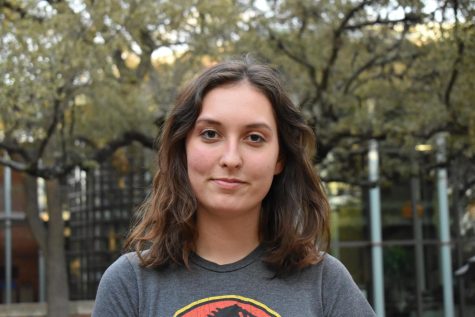
My name is Alejandra, and I'm a senior majoring in Neuroscience. I initially joined the Trinitonian as a first-year and worked my way up from a Sports...




